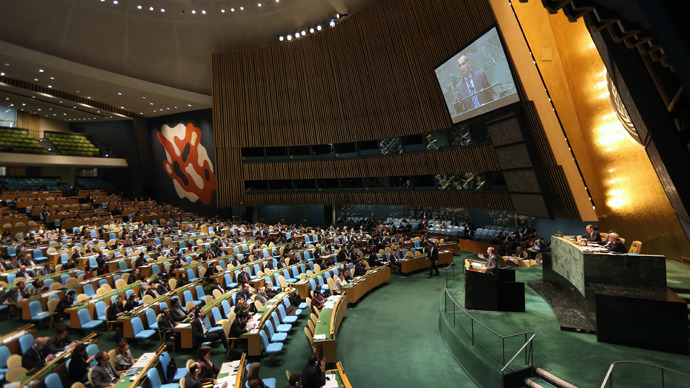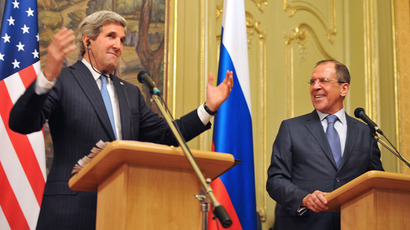'Counterproductive': UN General Assembly votes to condemn Assad's forces in Syria war

The UN General Assembly voted to pass an Arab-backed draft resolution that strongly condemns the Assad government and embraces the political viability of the Syrian National Coalition. Russia’s UN envoy characterized the resolution as “counterproductive.”
The 193-member world body voted on Wednesday to pass the
Qatari-drafted resolution condemning Syrian government forces and
the “gross violation” of human rights in the country.The
final vote tally: 107 in favor, 12 against and 59 abstentions.
Russia, China, Syria, Iran and North Korea were among 12 countries
to oppose the resolution, while South Africa, India and Brazil were
among the dozens who abstained.
The draft resolution further welcomes the establishment of the
Syrian National Coalition "as effective representative
interlocutors needed for a political transition."
The document noted "the wide international
acknowledgment" that the main opposition group is the
legitimate representative of the Syrian people.
General Assembly resolutions are not legally binding and therefore cannot be enforced. The last Arab-sponsored General Assembly resolution regarding Syria was approved by an vote of 133-12 with 31 abstentions last August. UN diplomats said the decline in support for Wednesday's resolution showed growing concern about the nature of Syria’s fractured opposition fighting against the president of Bashar Assad.
Speaking before the vote, Syrian Ambassador Bashar Ja’Afari said
it was contradictory for the resolution to be tabled under the
Assembly’s agenda item on “prevention of armed conflict.”
Ja’Afari argued that the resolution would in fact escalate violence
by legitimizing the provision of weapons to “terrorists” in
Syria and “by recognizing one faction of the opposition as the
Syrian people’s legitimate representative."
He further said Al-Qaida-linked terrorists who had committed
“unprecedented savage crimes and human rights violations”
were operating in Syria thanks to the “involvement of
intelligence agencies of well-known States.” He concluded that
Syria was in favor of “Syrian-led national dialogue” which
would adhere to the will of “the great majority of the Syrian
people.”
Russia's UN Ambassador Vitaly Churkin had sent letters in the run-up to the vote urging all member states to vote "no" on the new resolution. He called it "one-sided and biased" as well as "counterproductive" in light of the agreement reached between Russian Foreign Minister Sergey Lavrov and US Secretary of State John Kerry in Moscow last week to convene a follow-up international peace conference on a political transition in Syria.

The Arab group decided to seek approval of a wide-ranging resolution on Syria in the General Assembly, where there are no vetoes, to express "international outrage" at the more than 2-year conflict which has claimed the lives of more than 70,000 people.
The draft strongly condemns what it characterized as the continued escalation in the Syrian regime's use of heavy weapons, including indiscriminate shelling from tanks and aircraft, as well as the use of ballistic missiles, cluster munitions and other weapons against populated areas.
It further expressed "grave concern at the threat by the Syrian authorities to use chemical or biological weapons, as well as at allegations of reported use of such weapons," demanding that Syria “strictly observe” international laws prohibiting the use of such weapons.
While the draft resolution put the onus of chemical weapon’s use on Damascus, the United Nations independent commission of inquiry on Syria said earlier this month that no evidence had been uncovered implicating the Syrian government in a chemical weapon attack.
In an interview to Swiss-Italian television, the lead commission member Carla Del Ponte revealed that the "investigators have been in neighboring countries interviewing victims, doctors and field hospitals and, according to their report of last week which I have seen, there are strong, concrete suspicions but not yet incontrovertible proof of the use of sarin gas, from the way the victims were treated."
However, rather than government forces, Del Ponte concluded:
"This was use on the part of the opposition, the rebels, not by
the government authorities."














